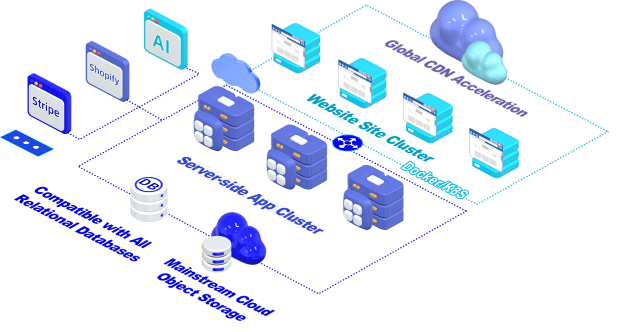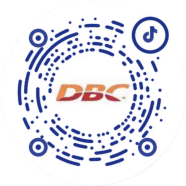 Mon-Fri, 9:00-17:00 (Beijing Time, UTC+8)
Mon-Fri, 9:00-17:00 (Beijing Time, UTC+8)Frontier Insights
We are dedicated to advancing the technology industry and sharing expertise in technical, business, and cultural domains.
We are dedicated to advancing the technology industry and sharing expertise in technical, business, and cultural domains.
Changes in Project Implementation - Interview with DBC's CTO
Over time, China's software and IT services industry has undergone profound changes. The rapid rise of emerging technologies like cloud computing, big data, IoT, mobile internet, AI, and VR marks its move toward maturity.
Dragon Bravo Corporation is a service provider specializing in software technology development, primarily offering omni-channel digital marketing solutions, digital marketing services, enterprise application consulting and development, and enterprise system operation and maintenance services to large enterprises. Based on leading solutions and numerous industry customer cases, it has successfully provided relevant information technology implementation and development services to multiple Fortune 500 companies.
Xiaoliang Shen, Vice General Manager and CTO of the company, has over a decade of experience in software development and solution architecture, witnessing the evolution of China's software and IT services industry. As the lead for various DBC projects, Mr. Shen shares key "hardcore" elements of successful project implementation based on his extensive experience.

Changes in development models require greater attention to DevOps
In recent years, software development has increasingly shifted toward cloud-based approaches, with more focus placed on DevOps. DevOps (an abbreviation for Development and Operations) is a set of processes, methods, and systems used to promote communication, collaboration, and integration between development (application/software engineering), technical operations, and quality assurance (QA) departments. In recent years, the waterfall model has gradually been replaced by agile development models, meaning that development needs to be faster and ideas must be quickly converted into code to minimize wasted time. Communication within teams needs to be tighter, so we need to "embrace" DevOps because it makes our software development faster, more frequent, and more reliable.
Evolving tools and methodologies
As the industry evolves, numerous collaboration and development tools have emerged. Version control tools like Git, GitLab, and GitHub have greatly boosted team efficiency. Meanwhile, the rapid growth of PaaS platforms—such as Kubernetes (K8s) and PCF—is gaining attention for enhancing deployment and operations. Moving forward, developers should focus more on coding and business logic to maximize core value creation.
Diversification of programming languages
In the past, many programmers believed that one particular development language would eventually be replaced by another. With the development of the internet, when new languages continue to emerge, people have gradually realized their original views were not entirely correct. In fact, the emergence of new languages does not necessarily bring increased productivity; different development languages and technologies play distinct roles in various fields. The world is diverse, including the technology field, where different languages shine brightly in their respective domains.
Changing domestic development culture
China's software development culture is gradually undergoing positive change: shifting from blindly following others to becoming a global leader. It can be said that China has at least reached a relatively advanced level, as Chinese software developers have become more independent in thinking.
Looking back ten years ago, when browsing various developer forums and websites, most people followed trends related to foreign servers, frameworks, languages, and design concepts.
However, with the rapid development of China's internet and the rise of unique industries, we now face many unprecedented challenges, such as e-commerce, high concurrency, and big data, which we must solve through our own innovation. Therefore, today's generation of engineers has become increasingly confident.
Smaller development team sizes
Ten years ago, developing a system might have required assembling a team of 30 or even 40 people. Today, often only 10 or fewer people are needed. This is due to the continuous evolution of development tools, maturing methodologies, and the widespread use of collaborative tools. Similarly sized projects now require much smaller development teams than a decade ago.
The gaps between development team roles are also narrowing. From previously having clearly defined responsibilities, individuals now often take on multiple roles within the team. This change presents higher demands and challenges for current engineers.
Summary
China's software industry market is currently experiencing, and will continue to experience, rapid growth and increasing maturity. This presents both opportunities and challenges for all businesses and professionals in this industry.
Facing continuous development, Mr. Shen Xiaoliang recommends that companies should emphasize talent cultivation and establish a set of development standards and working methods tailored to their characteristics. Regarding talent cultivation, Mr. Shen believes that bringing in external talent is less effective than nurturing internal capabilities. Companies need to treat internal talent development as an investment, significantly enhancing team cohesion and employee loyalty while improving team members' overall quality.
For industry professionals, Mr. Shen emphasizes the importance of being down-to-earth and maintaining good thinking habits. Fundamental skills are extremely important and should never be neglected, such as English reading ability, computer basics, and algorithm fundamentals. Strengthening one's basic abilities is crucial, requiring everyone to build a solid foundation.
Research, development, and implementation aimed solely at capital markets may create a restless atmosphere throughout the industry. No matter what, all individuals within the industry need to stay grounded and cultivate good habits of independent thinking.

Want to know more about our products?
With years serving Fortune 500 clients, we offer flexible solutions and integrated implementation.
Want to know more about our products?



Xiaohongshu

WeChat Channels

Douyin


Xiaohongshu

WeChat Channels

Douyin
To enhance your browsing experience, analyze website traffic, and optimize our services, we use cookies. By continuing to browse this website, you agree to our use of cookies. For more information, please read our Privacy Policy and Terms of Use.
To enhance your browsing experience, analyze website traffic, and optimize our services, we use cookies. By continuing to browse this website, you agree to our use of cookies. For more information, please read our Privacy Policy and Terms of Use.





